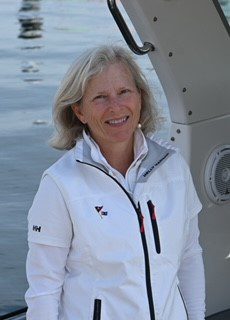Ellen Pesch is exactly the kind of person you want on the committee boat when you compete.
She’s well trained, understands the rules, is thoughtful and fair, has competed as a sailor herself, has earned several certifications, and is driven to continually learn more.
Because of you, people like Ellen are able to study with the most experienced trainers and hone their skills as Certified Race Officials. Thank you!
“I wasn’t born into sailing,” says Ellen Pesch. “I married into it.”
Ellen learned to sail from her husband, Daniel, and the two have competed together for many years. She also became a “sailing mom” when their two children took up the sport. That’s when her days as a race officer began.
Like most sailing parents, Ellen spent time ashore in various cities while her children competed. One day, another parent invited her onto the committee boat so she could watch her 13-year-old son on the water.
“I had no idea that was a thing you could do,” she says. “So I went out and it was fun.”
The committee put her to work writing down sail numbers, which she found interesting. After that, when she’d go to away regattas, she would offer an extra hand to the committee as an ad-hoc volunteer. And she got hooked! She looked into ways to learn more and discovered race administration classes and the Race Officer certification process.
“If you give me a challenge, I’ll usually try to rise to the occasion,” Ellen says. So become a certified race officer? Yes please!
Fast forward years later, and Ellen has gone from being an occasional one-day volunteer, to a Club Race Officer and PRO, to a Regional Race Officer. She has officiated at regattas across the country, and she recently served on the race committee for the ORC World Championship in Newport, RI.
“I would never be competing at this level,” she says. “But to be here on the team and be with the top sailors in the world is a great experience.”
An attorney by trade, Ellen knows that just reading a book full of rules can be daunting (and sometimes boring) and it’s more important to understand how those rules work in real life and be able to apply them in a variety of situations. And that, she says, is what the courses offered by US Sailing do. They take the Racing Rules of Sailing and teach people how to apply them in a practical way.
“I’ve been fortunate that all my advanced race management courses have been taught by Tom Duggan and Peter Reggio. It’s amazing to watch the two of them and hear the stories and the experiences that they have had.
“Understanding how they’ve seen the rules come into play and how they’ve interpreted them and applied them and how it’s worked out for them – like if it goes to a jury or if there are challenges – understanding all that helps me interpret the rules and know how to apply them, too.”
Being a race official has also impacted Ellen’s own sailing. She’s more of a cruiser than a competitor now, but when she is racing, she can think ‘that might not be the best action to take’ or ‘this might be what the race committee will do next’ and offer suggestions based on her race committee experience.
Ellen has encouraged many others to take the Basic Race Management Seminar – even if they don’t plan to become certified – because it increases a sailor’s familiarity with the rules and how they play out in the sport. That kind of information can be invaluable on the racecourse, no matter what role you play. She also recommends the Advanced Race Management Seminar because it goes into more detail and gives you a much broader perspective.
It has been more than 15 years since Ellen started her journey in race administration. “I’m kind of surprised at how addictive it has become!” she says. Every year, she does more and more race management. It’s a hobby that requires time away from work and from her family, but it’s a great way to be out on the water and be part of a team.
For Ellen, being certified is an important factor. “The requirements to get certified are very high but that’s a good thing,” she says. “Having the title makes me feel a little bit better, and it gives me credibility, so for me, it’s worth it.”
If you’d like to learn more about race management courses and the certification process, visit Rules/Officiating – US Sailing.

